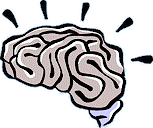
We know that regular brain exercise boosts your sharpness, memory and overall mental abilities...but could it also actually increase that supposedly innate, fixed element, your IQ?
As reported by New Scientist, a person's IQ - a measure of all kinds of mental problem-solving abilities, including spatial skills, memory and verbal reasoning - was thought to be a fixed commodity largely determined by genetics. But recent hints suggest that a very basic brain function called working memory might underlie our general intelligence, opening up the intriguing possibility that if you improve your working memory, you could boost your IQ too.
Working memory is the brain's short-term information storage system. It's a workbench for solving mental problems. For example if you calculate 73 - 6 + 7, your working memory will store the intermediate steps necessary to work out the answer. And the amount of information that the working memory can hold is strongly related to general intelligence.
A team led by Torkel Klingberg at the Karolinska Institute in Stockholm, Sweden, has found signs that the neural systems that underlie working memory may grow in response to training. Using functional magnetic resonance imaging (fMRI) brain scans, they measured the brain activity of adults before and after a working-memory training programme, which involved tasks such as memorising the positions of a series of dots on a grid. After five weeks of training, their brain activity had increased in the regions associated with this type of memory (Nature Neuroscience, vol 7, p 75). “Working memory training could be the key to unlocking brain power.
Perhaps more significantly, when the group studied children who had completed these types of mental workouts, they saw improvement in a range of cognitive abilities not related to the training, and a leap in IQ test scores of 8 per cent (Journal of the American Academy of Child and Adolescent Psychiatry, vol 44, p 177). It's early days yet, but Klingberg thinks working-memory training could be a key to unlocking brain power. "Genetics determines a lot and so does the early gestation period," he says. "On top of that, there is a few per cent - we don't know how much - that can be improved by training."
